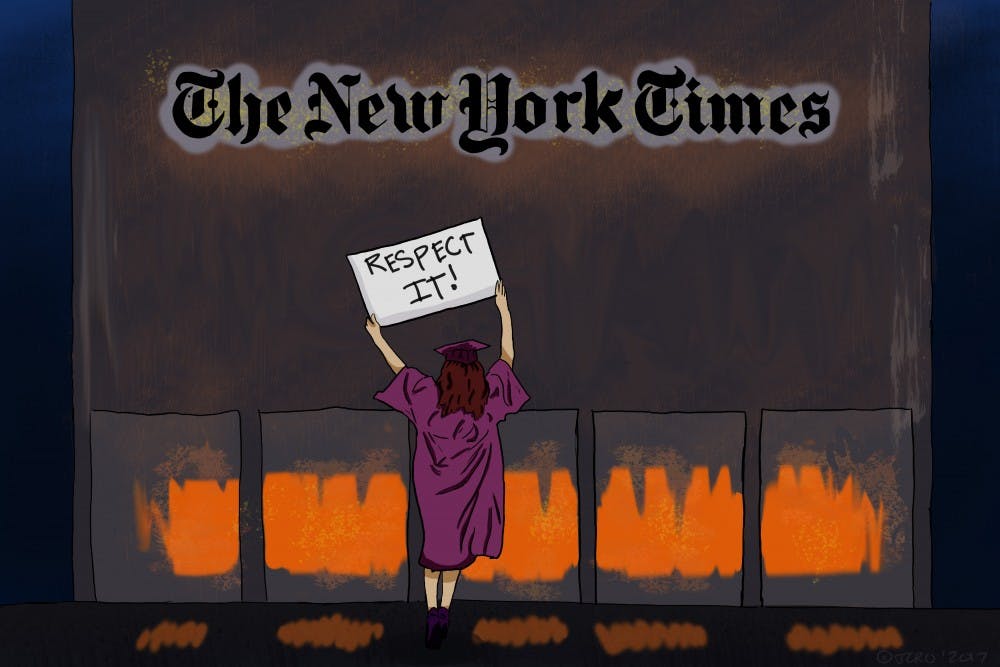Liars. Biased. Nosey. Rude. Journalists have been called every name in the book.
Amid accusations of being “fake news,” trust in the fourth estate is dwindling. Journalism is becoming an unpopular profession and career choice for undergraduates, despite its crucial role in the government and society.
While people can have opinions about the media, if they don’t support the students who are studying journalism now, the relationship between media consumers and producers won’t improve in the future.
“(Journalism) is the only kind of outside-the-government activity that monitors what society in general and the government in particular are doing,” Stephen Doig, Knight Chair in Journalism at ASU's Cronkite School, said. “It’s independent from the government, which I think is the important thing. You need to have some agency, some body, some group to be able to sound the alarm if there are problems.”
Journalism is a hard profession. Covering car crashes, elections and cases of fraud makes it hard for journalists to have a good reputation. Some people even think journalists have agendas when producing content, but our job is to ask the nosy questions and find out the truth for the betterment of our country. It is important to keep in mind that within every profession there are some ill-intentioned people, but they don't represent the profession as a whole.
According to a 2016 Gallup survey that measured trust in the media, only 32 percent of Americans said they trusted the media a "great deal" or a "fair amount." Since 2015, the number of Republicans who trust the media dropped from 32 to 14 percent, while Democrats’ trust levels dropped from 55 to 51 percent.
As a journalism student, I have already begun to see the negativity surrounding my future career and I have received a fair share of commentary on my choice to study journalism.
These comments have varied from my Uber driver who said, “Don’t be another one of those liberal journalists,” to my peers in other majors who said, “It must be really hard to be excited for your future when nobody trusts you guys, because you’re all biased.”
Those who have commented on my career decision base their critiques on mistakes or accidents others have made, not based on my personal talents and passions.They don't consider what my generation can bring to journalism in the future and the hard work we are putting in to be the best.
“A big part of our image problem is a lot of people can’t distinguish the difference between journalists, people that are actually out gathering the news and so on, and what I guess I would call pundits, the people who are on cable news who will sit in panels and yell at each other,” Doig said.
The hardest part about being a student journalist is people expect us to be as good, accurate and timely as those in the industry. While my peers and I all strive to do this, the fast-paced nature of journalism forces us to become professionals almost instantaneously, leaving us little time to be students.
Doig said the Cronkite School works to give students the tools to do good journalism by teaching them a variety of skills including how to gather information and write a clear story for different media platforms.
“Hopefully, we are also teaching them about the ethical responsibilities of journalism — that the job that you're doing is actually an important one … and therefore it's your responsibility to do it well,” Doig said.
J-schools and journalists in the industry are trying to better prepare us for what we will have to report on in the future and how to be accurate, unbiased and timely.
Doig said there are more than 100 accredited journalism programs, which are accredited based on common standards of good journalism education. Every six years, accredited schools go through an evaluation of their curriculum, professors, research and students' achievements to see if they are keeping up with standards.
Students not only leave the Cronkite School, and other accredited J-schools, published and well-educated in industry standards, but they also leave ready for the world of journalism. Because these schools are accredited and prepare students based on industry standards, media consumers should have faith in journalists.
You can cut us a little slack for being new to journalism or hold us to an even higher standard than those out in the industry, but just don’t give up on us.
Reach the columnist at afsuthe1@asu.edu or follow @a_sutherland10 on Twitter.
Editor’s note: The opinions presented in this column are the author’s and do not imply any endorsement from The State Press or its editors.
Want to join the conversation? Send an email to opiniondesk.statepress@gmail.com. Keep letters under 500 words and be sure to include your university affiliation. Anonymity will not be granted.
Like The State Press on Facebook and follow @statepress on Twitter.




